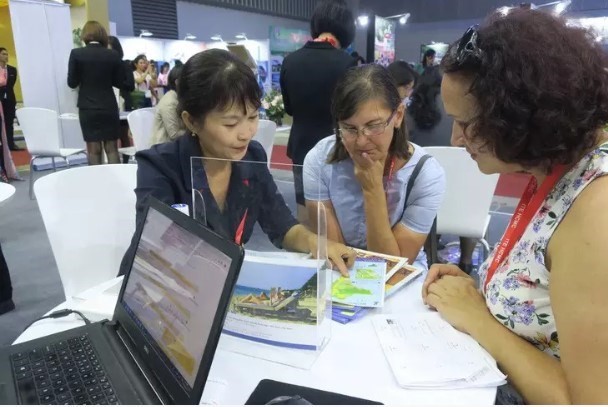 |
| According to Visa’s Consumer Payment Attitudes Study 2022, over 70% of Vietnamese consumers are generally receptive to open banking, especially fintech and non-bank service providers that can open an account for them using their existing data with banks. Photo: VNA |
The Asian Development Bank (ADB) and Switzerland have signed a co-financing agreement of up to USD 5 million to develop financial technologies (fintech) that can help address low financial inclusion in Vietnam, particularly among small and medium-sized enterprises (SMEs), as reported by the Vietnam News Agency (VNA). These cutting-edge technologies have the potential to promote financial inclusion, particularly for SMEs, who are often excluded from traditional banking services. This initiative is expected to help bolster the financial sector in Vietnam, and enable more people to access the banking services they need.
This funding, in combination with a USD 2 million contribution from the Japan Fund for Prosperous and Resilient Asia and the Pacific, financed by the Government of Japan, will be used to finance a technical assistance (TA) project that intends to broaden inclusive and climate finance in the nation.
Fintech has been at the heart of Vietnam’s government’s plans to increase financial services to consumers and small and medium-sized enterprises (SMEs). The Technical Assistance (TA) program will help the State Bank of Vietnam (SBV) to strengthen the regulatory framework for digital finance, build the capacity of government and other industry stakeholders, and aid financial institutions in developing digital banking.
ADB Director General for Southeast Asia Winfried Wicklein highlighted the fact that traditional financial institutions rely heavily on collateral-based credit decisions, which can be disadvantageous to small and medium-sized enterprises (SMEs) that typically have little or no collateral to provide. Additionally, banks tend to centralize their credit processes, making it relatively more expensive to process smaller loans. This Technical Assistance (TA) could provide potential solutions such as alternative credit scoring and introducing digital lending.
Almost 80% of Vietnam’s population is either unbanked or underbanked. Microenterprises and small and medium-sized enterprises (SMEs) are particularly affected, with their unmet financing needs estimated to be around VND 500 trillion (approximately USD 21 billion).
Women-owned and female-led SMEs (WSMEs) are even more adversely affected. Women entrepreneurs in Vietnam have an estimated USD 1.2 billion, but very few banks have taken active measures to pursue this lucrative market opportunity.
The TA will aid in increasing women’s access to financing, including offering training opportunities on fintech and green banking best practices to SBV personnel, with a goal of 25% female involvement, as well as providing consulting services to WSMEs on creating green loan applications.
It is expected that the implementation of green banking by SBV will not only help Vietnam to achieve its goal of reaching net-zero carbon emissions by 2050, but also to secure the USD 11 billion annual financing required for the same. Moreover, SBV can use the opportunity to refine its policies on green banking and communicate them to the stakeholders of the finance sector.
 |
| Women entrepreneurs in Vietnam have an estimated 1.2 billion USD, but few banks have taken active measures to pursue this market opportunity. Photo: ADB |
Head of Economic Cooperation and Development at the Swiss State Secretariat of Economic Affairs (SECO) and Switzerland’s Governor to ADB, Dominique Paravicini, has stated that Switzerland is actively supporting Vietnam in its digital transformation of the financial sector by improving the regulatory environment for innovative fintech solutions and developing the capacities of market players in digital finance. This will ultimately benefit small and medium-sized enterprises (SMEs) in the country, providing them with better access to finance and enabling them to expand their businesses.
|
Based in Bern, SECO is the Swiss Confederation’s expert hub for all core economic policy issues, including economic cooperation and development. It implements Switzerland’s economic and trade policy measures to the advantage of developing countries, providing support for economic growth and sustainable prosperity in its partner countries. ADB is dedicated to creating a prosperous, equitable, resilient, and sustainable Asia-Pacific region, while continuing its efforts to eliminate extreme poverty. Founded in 1966, it is owned by 68 members—49 from the region. |
On March 21, AsiaOne.com, one of Singapore’s leading digital content sites, published an article titled “Vietnam: Can it become the Fintech Mecca of the East?” This article highlighted the fact that Vietnam’s fintech industry has reached new heights, with its growth being driven by the introduction of a new legal framework.
According to the article, Vietnam’s National Digital Transformation Programme by 2025 has greatly accelerated the inclination towards fintech.
Boasting of around 200 fintech organizations, a whopping 66% of adults now have payment accounts as reported by the Ministry of Planning and Investment. What’s more, the combination of 91.3 million smartphone subscribers and an internet penetration rate of 73.2%, has further contributed to the industry’s growth and development.
The success of these promising fintech organizations has been linked with their close ties with the banking sector, resulting in invaluable synergies, according to the article.



